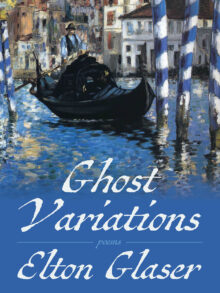
Elton Glaser
Elton Glaser is distinguished professor emeritus of English at the University of Akron, where he also directed the University of Akron Press and edited the Akron Series in Poetry. He is the author of eight poetry collections, most recently The Law of Falling Bodies and Translations from the Flesh. With William Greenway, he coedited I Have My Own Song for It: Modern Poems of Ohio. Among his awards are fellowships from the National Endowment for the Arts and the Ohio Arts Council, the Iowa Poetry Prize, the Crab Orchard Poetry Award, and the Miller Williams Arkansas Poetry Prize.
Ghost Variations
Poems
Finalist, 2024 Ohioana Book Award in Poetry | Honoree, 2024 Midland Authors Award in Poetry
Elton Glaser’s ninth book of poems is haunted by the loss of his wife, each April bringing back the memory of her death. The opening line confesses the struggle to find a language for this grief: “I’m learning to speak in the accents of adieu.” As the book progresses through the seasons, it evokes the places that remind him of their times together, in the South of their youths, in the Midwest of their long marriage, and in their travels here and abroad. And yet there is also another strain that keeps breaking through, the particulars of joy in family and the natural world, grandsons and “swaggering lilies,” and a swan like “a sullen bride in her white finery.” With an irrepressible wit and a music that enlivens his lines in both celebration and elegy, Glaser never forgets that, as Wallace Stevens said, “Memory without passion would be better lost.”
Translations from the Flesh
Translations from the Flesh, Elton Glaser’s seventh full-length collection of poetry, is driven by the powerful engines of love and desire. In poems long and brief, playful and intense, Glaser evokes what it feels like “to fall into / Love and its infinite mistakes.” In a style that might be described as “flamboyant stoicism” (a phrase from Simon Callow,) he explores our human urgencies and weaknesses, following wherever our appetites lead us, whether hormonal or spiritual, cravings that we struggle to understand. The voice that says “Apprentice me to mysteries of the flesh” speaks for everyone intent on making sense of the body’s restless yearning for fulfillment. These poems, with their witty brio and passionate precision of language, agree with Gerald Stern that “the brain / is the best organ for love.” At the same time, they are not afraid to get down in the dirt, among the more primitive pleasures. Whatever their bent, from moony aspirations to “rare positions only the wicked know,” the poems express Glaser’s mission to give voice to those deep pressures that move us, body and soul: “I put my native tongue / To work, open to / The dark instincts of ecstasy.”


